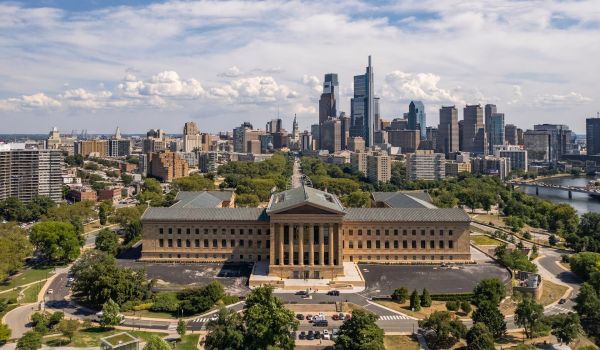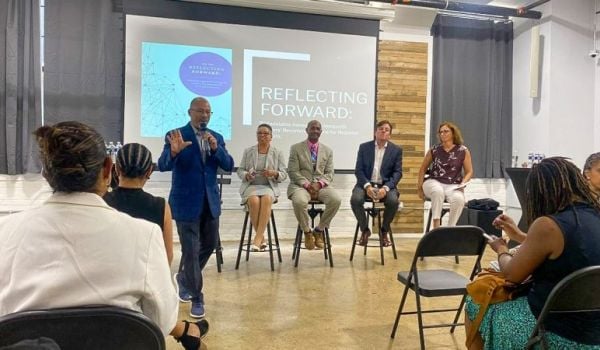EDITOR’S NOTE: Since Oscar wrote this story in early March 2020, more than 80 percent of Philadelphia voters approved this ballot measure in the June 2 primary.
Nadia Hewka has been fighting against wage theft pretty much since the day she first came to work at Community Legal Services of Philadelphia — in 1997. Then, the term “wage theft” wasn’t yet the established term. The going phrase at the time was “underpayment of wages.”
“It just doesn’t capture what’s happening,” Hewka says. “People’s labor and hours and time are being stolen when their wages are stolen.”
Wage theft comes in a few different forms. Employers may refuse to pay workers, pay them less than minimum wage, refuse to pay overtime, undercount workers’ hours or otherwise fail to pay workers for hours that qualify as work under the law. Employers may require workers to work before and after their shifts or before or after they have clocked in, without compensation.
All those forms of wage theft are already illegal, by state or federal law, or both. But enforcing those laws has been another story. Enforcing worker rights, from wage theft and beyond, has long depended on victims taking employers to court. Often, employers don’t get caught because not every wage-theft victim has the time and resources to meet with lawyers, give extensive depositions and go through a legal battle in court.
Wage theft most affects low-wage workers. In a landmark 2015 study from the Sheller Center for Social Justice at Temple University Beasley School of Law, which looked at wage theft across Pennsylvania, researchers found that in the five-county Philadelphia metropolitan area alone, every year an estimated 128,476 low-wage workers experienced minimum wage violations, 105,458 experienced overtime nonpayment violations, and 83,344 experienced off-the-clock violations. That report helped fuel the campaign in 2016 to finally make wage theft illegal at the local level in Philadelphia.
That was just one of a string of victories by Philadelphia’s worker justice movement over the past few years — often with workers themselves at the forefront of shaping new laws and regulations. The victory on paid sick leave came in 2015, with wage theft shortly thereafter. Barring employers from asking job applicants about their criminal records was already in effect for some employers as of 2011, but was significantly expanded in 2016. Fair workweek legislation passed in 2018 — though its effective date has been postponed until April 1 of this year. And last year Philadelphia set the new gold standard for a Domestic Worker Bill of Rights, protecting a class of workers that still remains barred from unionizing under federal law.
To enforce those laws, Philadelphia at-large Councilmember Helen Gym has co-sponsored a ballot initiative, appearing on the ballot during the April 28 Pennsylvania primary, that would create a city Department of Labor. The city already has an Office of Labor in the Mayor’s Office, created after the paid sick leave legislation passed, but it wasn’t fully staffed or funded in its first few years. By the time the fair workweek law passed in 2018, there were still only three people working at the office. (As the Philadelphia Inquirer reported, advocates more recently won a modest increase in funding for the office, which grew its budget to nearly $1.1 million for 2020 and doubled its staff to six.)
A Labor Department would also be more permanent and not tied to the whims of a particular mayor, advocates say.
“It can be tricky to get city council to get more money to the mayor’s office just to do what he wants. Being its own department will be more transparent, they’ll be answerable to city council on budgets,” Hewka says. “That’s the big benefit of having it be permanent and have its own line item in the budget for certain things.”
Philadelphia establishing a Department of Labor would bring it in line with most other big cities, which already have departments charged with enforcing local labor laws. Assuming voters approve the ballot initiative, it will be the second year in a row that Philly voters have amended their city charter to add a new permanent department — last May, voters approved a ballot initiative adding the Office of Immigrant Affairs to the city’s permanent agencies.
The modest increase in staff at the office under the mayor has already led to an increase in responsiveness, which in turn has led to more workers reporting possible violations. In 2019, workers filed just under 100 complaints to the office, a modest number but four times more than they filed in 2018, the Inquirer reported.
“The fact that they are functioning makes people want to go there and bring cases,” Hewka says. “It’s seen as a real option.”
It’s especially important in the current political climate for Hewka’s clients to have a viable local option for reporting wage theft violations — the most vulnerable to wage theft have always been undocumented immigrants or those supporting undocumented family members.
“At the federal level, there have been periods of time when they have been doing more versus less on behalf of wage theft victims,” Hewka says. “But a lot of my clients have real fears when it comes to contacting the federal government right now.”
Meanwhile, at the state level, among the ten most populous states, Pennsylvania is among the worst when it comes to the severity of wage theft. In Pennsylvania and Texas, the average victim of a minimum wage violation is cheated out of over 30 percent of earned pay, according to a study by the Economic Policy Institute. Under Pennsylvania’s wage theft law, a worker is only entitled to a maximum of $500 or 25 percent of the wages owed, whichever is greater. The law also states that the potential criminal penalty to an employer is a maximum fine of $300 and up to 90 days imprisonment.
Enforcement is also lacking at the state level, according to the Sheller Center’s 2015 report, which found that the state closes approximately 5,000 wage theft cases per year but manages to collect wages on behalf of workers in only about 2,000 of those cases.
Hewka is looking forward to the new Philadelphia Department of Labor being proactive and negotiating larger settlements on behalf of multiple workers, as has happened in other major cities.
In Seattle, where the city created its permanent Office of Labor Standards in 2015, that office filed 918 investigations from 2015-2019, of which it has resolved 821, resulting in 527 settlements and 97 determinations of violating the city’s labor laws. Those settlements and determinations have resulted in $6 million in financial remedies assessed on behalf of 10,000 workers. That includes $4.4 million assessed for wage theft or minimum wage violations on behalf of 4,400 workers.
“Doing something that’s not just reacting to claims walking in the door but taking a proactive perspective makes a big difference in tone and tenor,” Hewka says.
Some in the business community are likely to bristle at the possibility of being hit with a case like that, but not all.
At least one business group, the Sustainable Business Network of Greater Philadelphia, supports the range of new worker rights in Philadelphia. The group also supports “a thriving wage — one that not only covers the most basic needs, but also pays enough for retirement and emergency expenses, as well as health care, childcare, and other standard cost of living expenses that are often overlooked.” These positions are outlined in the group’s first policy position paper, released earlier this month, containing a number of policy statements focusing on economic justice as well as addressing climate change and more equitable business growth.
“But I also think a policy or rule or guideline is only as good as its implementation,” says Anna Schipp, executive director of the network. “That’s why it’s important for the workers themselves to be educated on what are their rights but also important for the businesses to know what are their responsibilities, and we want to advocate for any support they need to make the necessary changes in their businesses.”
Schipp says her organization will spend the next few months asking its 325-plus members what they might need in terms of consulting services, tech tools or other resources to ensure ongoing compliance. The new worker protections don’t necessarily apply to all employers — fair scheduling, for example, only applies to retail, hospitality and food service employers that employ 250 or more employees regardless of where they work, and have 30 or more locations worldwide.
“But we see those thresholds as a baseline,” Schipp says. “Even if you’re not a business that meets those thresholds, our [organization’s] mission is to educate all businesses about the importance of worker protections regardless. Trends are showing that workers and consumers care about this stuff and are going to be making more choices that reflect their values. Values-based businesses, I think, are poised for growth.”
Schipp says her group hopes to partner with the city to educate the business community on its responsibilities under the new laws.
Similarly, the coalition of worker justice groups behind the new protections want to partner with the city to educate more workers on the rights they have.
“It’s important for the city to be out there talking about it but also for organizations workers trust to share that message,” says Marianne Bellasorte, vice president of advocacy at PathWays PA. “The more people hear about it, the more people are going to start checking to see if they’re getting the leave or the wages or whatever else they are supposed to get.”
This article is part of The Bottom Line, a series exploring scalable solutions for problems related to affordability, inclusive economic growth and access to capital. Click here to subscribe to our Bottom Line newsletter.

Oscar is Next City's senior economic justice correspondent. He previously served as Next City’s editor from 2018-2019, and was a Next City Equitable Cities Fellow from 2015-2016. Since 2011, Oscar has covered community development finance, community banking, impact investing, economic development, housing and more for media outlets such as Shelterforce, B Magazine, Impact Alpha and Fast Company.
Follow Oscar .(JavaScript must be enabled to view this email address)


















